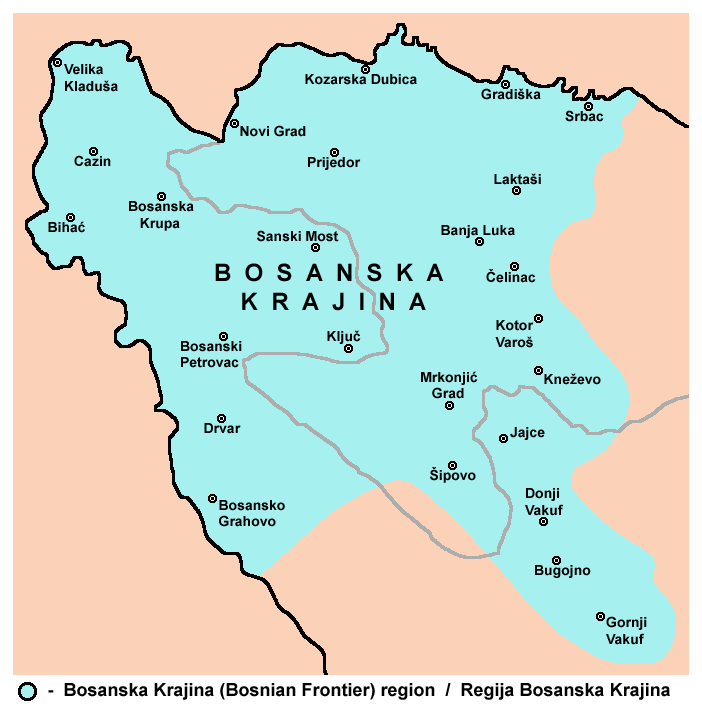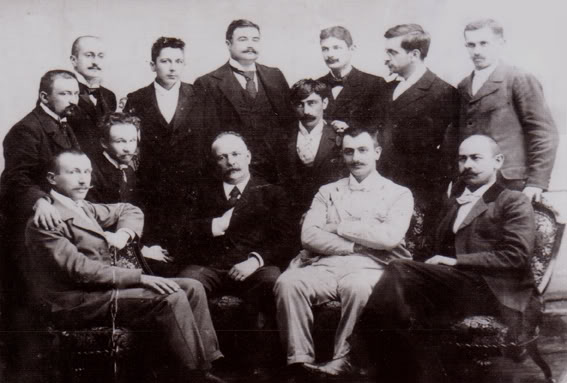|
Mane Rokvić
Mane Rokvić ( sr-Cyrl, Мане Роквић) was a Serbian guerrilla commander during the World War II, Second World War. Rokvić briefly commanded of the Yugoslav Partisans, Yugoslav Partisan 4th detachment of the ''Sloboda Battalion'' during the 1941 Drvar uprising, a spontaneous resistance by the Serbian population to the genocidal activities of the Independent State of Croatia in Western Bosnia. Later and most notably, Rokvić left the communist cause to join the royalist Dinara Division, Dinara Chetnik Division to command of the ''King Alexander I'' regiment. Early life Rokvić was born in Kolunić near Bosanski Petrovac, in modern-day Bosnia and Herzegovina. Prior to the Second World War, Rokvić was employed as a mechanic in the Šipad lumber and furniture factory in Drvar. He joined the League of Communists of Yugoslavia, Yugoslav Communist Party in 1929. World War II As commander of the Medeno Polje based 4th detachment of ''Sloboda Battalion'', Rokvić is credited wi ... [...More Info...] [...Related Items...] OR: [Wikipedia] [Google] [Baidu] |
Communist Party Of Yugoslavia
The League of Communists of Yugoslavia, mk, Сојуз на комунистите на Југославија, Sojuz na komunistite na Jugoslavija known until 1952 as the Communist Party of Yugoslavia, sl, Komunistična partija Jugoslavije mk, Комунистичка партија на Југославија, Komunistička partija na Jugoslavija was the founding and ruling party of SFR Yugoslavia. It was formed in 1919 as the main communist opposition party in the Kingdom of Serbs, Croats and Slovenes and after its initial successes in the elections, it was proscribed by the royal government and was at times harshly and violently suppressed. It remained an illegal underground group until World War II when, after the invasion of Yugoslavia in 1941, the military arm of the party, the Yugoslav Partisans, became embroiled in a bloody civil war and defeated the Axis powers and their local auxiliaries. After the liberation from foreign occupation in 1945, the party consolidated ... [...More Info...] [...Related Items...] OR: [Wikipedia] [Google] [Baidu] |
Oštrelj
Oštrelj ( sr-cyrl, Оштрељ; ro, Oștreli) is a village in the municipality of Bor, Serbia Serbia (, ; Serbian language, Serbian: , , ), officially the Republic of Serbia (Serbian language, Serbian: , , ), is a landlocked country in Southeast Europe, Southeastern and Central Europe, situated at the crossroads of the Pannonian Bas .... According to the 2022 census, the village has a population of 523 people. References Populated places in Bor District {{BorRS-geo-stub ... [...More Info...] [...Related Items...] OR: [Wikipedia] [Google] [Baidu] |
Royal Yugoslav Army Personnel
Royal may refer to: People * Royal (name), a list of people with either the surname or given name * A member of a royal family Places United States * Royal, Arkansas, an unincorporated community * Royal, Illinois, a village * Royal, Iowa, a city * Royal, Missouri, an unincorporated community * Royal, Nebraska, a village * Royal, Franklin County, North Carolina, an unincorporated area * Royal, Utah, a ghost town * Royal, West Virginia, an unincorporated community * Royal Gorge, on the Arkansas River in Colorado * Royal Township (other) Elsewhere * Mount Royal, a hill in Montreal, Canada * Royal Canal, Dublin, Ireland * Royal National Park, New South Wales, Australia Arts, entertainment, and media * ''Royal'' (Jesse Royal album), a 2021 reggae album * ''The Royal'', a British medical drama television series * ''The Royal Magazine'', a monthly British literary magazine published between 1898 and 1939 * ''Royal'' (Indian magazine), a men's lifestyle bimonthly * Royal Te ... [...More Info...] [...Related Items...] OR: [Wikipedia] [Google] [Baidu] |
Chetnik Personnel Of World War II
The Chetniks ( sh-Cyrl-Latn, Четници, Četnici, ; sl, Četniki), formally the Chetnik Detachments of the Yugoslav Army, and also the Yugoslav Army in the Homeland and the Ravna Gora Movement, was a Yugoslav royalist and Serbian nationalist movement and guerrilla force in Axis-occupied Yugoslavia. Although it was not a homogeneous movement, it was led by Draža Mihailović. While it was anti-Axis in its long-term goals and engaged in marginal resistance activities for limited periods, it also engaged in tactical or selective collaboration with the occupying forces for almost all of the war. The Chetnik movement adopted a policy of collaboration with regard to the Axis, and engaged in cooperation to one degree or another by establishing ''modus vivendi'' or operating as "legalised" auxiliary forces under Axis control. Over a period of time, and in different parts of the country, the movement was progressively drawn into collaboration agreements: first with the puppet Gove ... [...More Info...] [...Related Items...] OR: [Wikipedia] [Google] [Baidu] |
1944 Deaths
Events Below, the events of World War II have the "WWII" prefix. January * January 2 – WWII: ** Free France, Free French General Jean de Lattre de Tassigny is appointed to command First Army (France), French Army B, part of the Sixth United States Army Group in North Africa. ** Landing at Saidor: 13,000 US and Australian troops land on Papua New Guinea, in an attempt to cut off a Japanese retreat. * January 8 – WWII: Philippine Commonwealth troops enter the province of Ilocos Sur in northern Luzon and attack Japanese forces. * January 11 ** President of the United States Franklin D. Roosevelt proposes a Second Bill of Rights for social and economic security, in his State of the Union address. ** The Nazi German administration expands Kraków-Płaszów concentration camp into the larger standalone ''Konzentrationslager Plaszow bei Krakau'' in occupied Poland. * January 12 – WWII: Winston Churchill and Charles de Gaulle begin a 2-day conference in Marrakech ... [...More Info...] [...Related Items...] OR: [Wikipedia] [Google] [Baidu] |
Bihać
Bihać ( cyrl, Бихаћ) is a city and the administrative centre of Una-Sana Canton of the Federation of Bosnia and Herzegovina, an entity of Bosnia and Herzegovina. It is situated on the banks of river Una in northwestern Bosnia and Herzegovina, in the Bosanska Krajina region. In 2013 its population was 56,261. Settlements * Bajrići *Brekovica * Bugar *Ćukovi * Doljani *Donja Gata * Dubovsko *Gorjevac * Grabež * Grmuša * Hrgar * Izačić * Jezero *Kalati *Kulen Vakuf *Lohovo * Lohovska Brda *Mala Peća * Mali Skočaj * Međudražje * Muslići * Ostrovica * Papari * Praščijak * Pritoka * Račić * Rajinovci *Ripač * Spahići * Srbljani * Velika Gata * Veliki Skočaj *Veliki Stjenjani * Vikići *Vrsta *Zavalje i Zlopoljac History According to documents and historical sources, the first medieval urban settlements and towns around the Una river, began to appear in the middle of the 13th century. Bihać, as the centre of , was first mentioned on 26 February 1260, in the ch ... [...More Info...] [...Related Items...] OR: [Wikipedia] [Google] [Baidu] |
Bosanska Krajina
Bosanska Krajina ( sr-cyrl, Босанска Крајина, ) is a geographical region, a subregion of Bosnia, in western Bosnia and Herzegovina. It is enclosed by a number of rivers, namely the Sava (north), Glina (northwest), Vrbanja and Vrbas (east and southeast, respectively). The region is also a historic, economic and cultural entity of Bosnia and Herzegovina, famous for its natural beauties and wildlife diversity. The largest city, and its historical center is Banja Luka. Other cities and towns include Bihać, Bosanska Krupa, Bosanski Petrovac, Bosansko Grahovo, Bužim, Cazin, Drvar, Gradiška, Ključ, Kostajnica, Kozarska Dubica, Laktaši, Mrkonjić Grad, Novi Grad, Prijedor, Sanski Most, Šipovo, Velika Kladuša. Bosanska Krajina is not a formal entity within the structure of Bosnia and Herzegovina; however it has a significant cultural and historical identity that was formed through several historic and economic events. The territory of Bosanska Krajina is curre ... [...More Info...] [...Related Items...] OR: [Wikipedia] [Google] [Baidu] |
Slobodan Jovanović
Slobodan Jovanović ( sr-Cyrl, Слободан Јовановић; 3 December 1869 – 12 December 1958) was a Serbian and Yugoslav writer, historian, lawyer, philosopher, literary critic, diplomat, politician and one of the most prominent intellectuals of his time. He was the professor at the University of Belgrade Faculty of Law (1897—1940), Rector of the University of Belgrade (1913–14 and 1920–21), and the President of the Serbian Royal Academy (1928–1931). He took part at the Paris Peace Conference (1919) as an expert for the Yugoslav Government. Jovanović was the Deputy Prime Minister (March 1941 - June 1942) and the Prime Minister of the Royal Yugoslav government-in-exile in London between January 1942 and June 1943. After World War II, the new Communist authorities of Yugoslavia sentenced him in absentia to 20 years' imprisonment. Jovanović remained at liberty for the rest of his life in London. Biography Slobodan Jovanović was born in Újvidék, Austria-H ... [...More Info...] [...Related Items...] OR: [Wikipedia] [Google] [Baidu] |
Yugoslav Government-in-exile
The Government of the Kingdom of Yugoslavia in Exile ( sh, Vlada Kraljevine Jugoslavije u egzilu / Влада Краљевине Југославије у егзилу) was an official government of Yugoslavia, headed by King Peter II. It evacuated from Belgrade in April 1941, after the Axis invasion of the country, and went first to Greece, then to Palestine, then to Egypt and finally, in June 1941, to the United Kingdom, and hence it is also referred to as the "Government in London" ( sh, Vlada u Londonu / Влада у Лондону). Background According to economics professor and historian Jozo Tomasevich, the Kingdom of Yugoslavia was politically weak from the moment of its creation in December 1918, and remained so during the interwar period mainly due to rigid centralism combined with strong ethno-religious identities. In particular, the religious primacy of the Serbian Orthodox Church in national affairs and discrimination against Roman Catholics and Muslims compound ... [...More Info...] [...Related Items...] OR: [Wikipedia] [Google] [Baidu] |
Pavle Omčikus
Pavle (Macedonian and sr-cyr, Павле; ka, პავლე) is a Serbian, Macedonian, Croatian and Georgian male given name corresponding to English Paul; the name is of biblical origin (cf. Saint Paul). People known mononymously as Pavle include: * Pavle I, Serbian Patriarch (c. 1526–1541), Serbian Orthodox bishop * Pavle, Serbian Patriarch (1914–2009), Serbian Orthodox Patriarch People with this name include: * Pavle Abramidze (1901–1989), Georgian Soviet general * Pavle Dešpalj (born 1934), Croatian composer and conductor * Pavle Đurišić (1909–1945), Montenegrin Serb Chetnik army commander * Pavle Gregorić (1892–1989), Croatian communist politician * Pavle Ingorokva (1893–1983), Georgian historian * Pavle Ivić (1924–1999), Serbian linguist * Pavle "Paja" Jovanović (1859–1957), Serbian painter * Pavle Jurina (1954–2011), Croatian handball player * Pavle Kalinić (born 1959), Croatian politician and writer * Pavle Karađorđević (1893–1976), Pri ... [...More Info...] [...Related Items...] OR: [Wikipedia] [Google] [Baidu] |
Ilija Trifunović Birčanin
Ilija may refer to: * Ilija, Iran, a village in Ardabil Province, Iran * Ilija, Slovakia, a village and municipality in the Banská Štiavnica District, in the Banská Bystrica Region * Ilija (given name), South Slavic given name *ilija (puki) kanter People with the surname * Jože Ilija Jože Ilija (12 March 1928 – 19 May 1983) was a Slovenian slalom canoeist who competed for Yugoslavia in the 1950s. He won a bronze medal in the folding K-1 event at the 1955 ICF Canoe Slalom World Championships in Tacen. He was also an ..., Slovene canoeist See also * Sveti Ilija (other) {{disambiguation, surname, geo ... [...More Info...] [...Related Items...] OR: [Wikipedia] [Google] [Baidu] |




